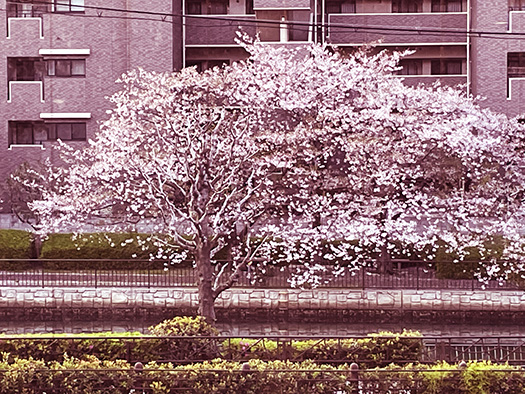
だんだんと日本語の起源ということに強く興味が「差し込んで」行く。本居宣長さんの古事記研究への情熱と子孫の,それを守っていく覚悟のようなものについて昨日触れた。
コトバということを考えて見るようになったのは、わたし的には司馬遼太郎さんの歴史探究であって、明治期の夏目漱石とその周辺で起こったことについての探索を知ったこと。
明治の革命というのはすごい革命であった。社会のあらゆることが根源的な革新をしてきていたのだということを、強く知らされたのですね。明治には迫り来る欧米列強の世界侵略競争という世界の「沸騰」情勢の中で、はるかに眠りこけていたアジア世界の中で、ひとり日本だけが社会革新に根源的に取り組んでいた。その時期に、夏目漱石などを中心とした,今日「文豪」というおどろおどろしい形容詞を冠せられたひとたちは「日本共通言語」を創造して、それを近代国家の基盤として行くのだという国家意志に突き動かされていた。
その象徴として夏目漱石は、日本唯一の高等教育機関として創設された東京大学になかば「召集」されて、さらに国家意志としてイギリスロンドンに滞在して「文学」を創造することを命じられていた。そういう明治の先人達のことを司馬さんは、その内面にまで迫って探究している。「明治の憂鬱」。
日本という国はそのようにして明治期「近代国家」になった。
しかしそのことはそれ1回だけではなかった。はるかな古代、世界の中でももっとも「富裕」な気候風土によって先端的な文化社会を形成していた縄文の世が、中国大陸に「律令国家」が成立するという「黒船」的文明革命の洗礼にさらされるようになって、言語自体が開発される革命を経験している。
わたし的にはこのような気付きに突き動かされ始めているのですね。
そういう視点で見るようになって表題のような「人名」にふかく心が鷲づかみされている。古事記のなかに出てくるこの女性人名に、完全にノックアウトされている(笑)。ニニギノミコトの奥さんである彼女こそ、サクヤという部分がやがて日本文化を象徴する「サクラ」の語源なのだということを知ってしまった。しかしそのこと以上に、その音感であるとか、表現された率直さ、シンプルさに圧倒的に好感を持たされてしまうのだ。
彼女の名前に、原・日本語の語感というもの、この気候風土を持つ列島で生きてきた人びとの「心性」が極限的に表現されていると感じている。
その素晴らしさに、この文化社会のよろこびが凝縮されているのではないか。そんな強い思いが片時も脳裏を離れなくなってきている。ヤバいかも(笑)。
English version⬇
[Ancient “human name” of Konohana-no-sakuya (木花之佐久夜).
The scene of being seen by Niniginomikoto on a Jomon beach under cherry blossoms in full bloom. It strongly appeals to the scene of the world of the original Japanese language. It grabs the eagle’s eye. The “eagle.
I am gradually becoming more and more interested in the origins of the Japanese language. Yesterday, I mentioned Mr. Motoya Nobunaga’s passion for the study of the Kojiki and the determination of his descendants to preserve it.
It was Ryotaro Shiba’s historical explorations that led me to think about Kotoba, and it was his exploration of Natsume Soseki and what happened around him during the Meiji period that led me to look at Kotoba in a different light.
The Meiji Revolution was a great revolution. You were strongly informed that everything in society had undergone a fundamental revolution. In the midst of the world’s “boiling” situation of the world invasion race of the Western powers that was looming in the Meiji era, only Japan, alone among the Asian world that was far asleep, was engaged in fundamental social innovation. At that time, people such as Soseki Natsume and others, who today are labeled as “great writers,” were motivated by the national will to create a “common language of Japan” and to make it the foundation of the modern nation.
As a symbol of this, Natsume Soseki was “called up” to the University of Tokyo, the only institution of higher learning in Japan, and was also ordered to stay in London to create “literature” as part of the national will. In this book, Mr. Shiba explores the inner lives of these Meiji predecessors. The “Meiji Melancholy.”
This is how Japan became a “modern nation” in the Meiji period.
However, this was not the only time. In ancient times, the Jomon period, which had formed a leading-edge cultural society in one of the richest climates in the world, experienced a revolution in the development of language itself when it came under the baptism of the “Black Ships”-like civilization revolution with the establishment of the “Ritsuryo State” on the Chinese continent.
I am beginning to be motivated by this realization.
It is from this perspective that I have come to be fascinated by the title of this book, “Names of Persons”. I am completely knocked out by the names of these women in the Kojiki (laughs). I have learned that she, the wife of Niniginomikoto, is the origin of the word “sakuya,” which eventually became a symbol of Japanese culture, “sakura. More than that, however, I am overwhelmingly impressed by the sense of sound, the frankness and simplicity with which it is expressed.
I feel that her name expresses, to the utmost limit, the sense of the original Japanese language and the “spirit” of the people who have lived in the archipelago with its climatic climate.
I believe that the joy of this cultural society is condensed in its splendor. Such a strong feeling has not left my mind for a moment. I may be in trouble (laugh).
Posted on 4月 14th, 2024 by 三木 奎吾
Filed under: 日本社会・文化研究







コメントを投稿
「※誹謗中傷や、悪意のある書き込み、営利目的などのコメントを防ぐために、投稿された全てのコメントは一時的に保留されますのでご了承ください。」
You must be logged in to post a comment.